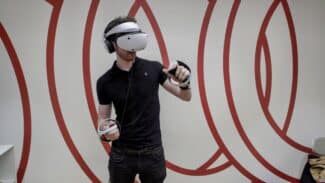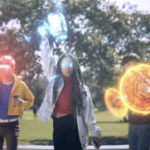I went hands-on with PlayStation VR2 last week. Here are my initial impressions of Sony’s next generation VR hardware.
Sony showed off four upcoming titles: a game made for PSVR 2 (Horizon Call Of The Mountain), a traditional AAA game ported to VR (Resident Evil Village), an upcoming multi-platform VR game (The Walking Dead: Saints & Sinners – Chapter 2: Retribution), and a former Meta Quest exclusive upgraded to take advantage of PlayStation 5 (Star Wars: Tales from the Galaxy’s Edge – Enhanced Edition).
All four titles were running off a real PlayStation 5 console with the headset connected via a single USB-C cable – no smoke & mirrors were at play here.
Impressive Display & Optics
The first thing you’ll notice when you put on this headset is the impressive visual quality. The lenses are clear throughout your field of view, and the high dynamic range OLED display delivers unrivalled contrast. The true deep blacks mean that in games like The Walking Dead and Resident Evil Village it really felt like I was in darkness – the murky greys of LCD headsets just can’t deliver this.
The field of view is noticeably wider than the original PSVR and headsets like Quest 2. This both adds to the immersion and helps you see enemies to the side of you.
The downside of OLED is that there is a visible fixed pattern noise (sometimes called mura), and this can be distracting in some scenes if you’re sensitive to visual detail. But I suspect many won’t even notice it.
Immersive Haptics
The new haptic capabilities genuinely add to the experience. The high fidelity vibrations in the controllers let me feel the tension in the bow string as I pulled it back in Horizon Call Of The Mountain, and the rumble motor in the headset meant it really felt like I was getting hit by the enemies.

When using the all-kit tool in Star Wars: Tales from the Galaxy’s Edge I could feel the precise rotation in my hands. If you thought precise haptics would just be a gimmick, think again.
Clear Passthrough
Unlike the original headset, PSVR2 has onboard cameras for tracking, and they’re also used to see the real world. This is how you set up your playspace, and you can activate See-Through View when needed.

The view isn’t color, but it is higher resolution than Meta Quest 2’s passthrough so you can actually make out details in your room. I also didn’t notice any distortion.
When you set up a new playspace the system will scan your room and suggest a reasonable boundary. This isn’t always perfect though, so you have the option to manually correct it using the controllers in the same way you draw Quest 2’s Guardian.
Eye Tracking Guides Your Fit
My favourite feature of PlayStation VR2 is that it uses eye tracking to guide you to adjust the lenses perfectly for your interpupillary distance (IPD) and to get the headset properly positioned on your face.
![]()
This is a really neat trick, and I hope that all consumer headsets with eye tracking copy the idea.
Tracking Quality
Controller tracking was flawless throughout all the demos I tried. Whether I was reaching behind my back, moving them rapidly, or even occluding one controller with the other, it just didn’t matter. I’m confident these controllers can handle any VR game Quest 2 can. The impressive performance is probably thanks to the sheer size of the controllers and thus their infrared LED rings. They’re bigger in real life than you’re probably assuming.

Headset tracking was mostly solid, but it did wobble a bit when I looked up at the bright lights on the ceiling, and I even got a Tracking Lost message a few times. The lighting in your living room probably doesn’t match Sony’s demo booths though, so I wouldn’t worry too much about this.
Worrying Double-Imaging Issue
A problem I saw in my time with PlayStation VR2 was a constant ghosting / double imaging effect. This made it difficult to read text unless I kept my head and hands still, and generally made PSVR2 feel less smooth than Quest 2 or PC VR when those platforms aren’t using SpaceWarp or Motion Smoothing.
I’m told this is caused by PSVR2’s 60 FPS to 120 Hz reprojection mode. We don’t yet know how many games will use that mode, but I hope that most will use the native 90 FPS or 120 FPS, because 60 FPS just wasn’t visually comfortable.
Conclusions
PlayStation VR2 offers striking visuals, a noticeably wider field of view, and high fidelity haptics. The reprojection issue is disappointing, but this is still the most immersive consumer headset I’ve tried to date.
If you have any questions, join us in the comments on our weekly podcast, VR Download, where we’ll be discussing my impressions along with the week’s VR news.






